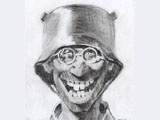Today.Az » Analytics » Saint simplicity of murderers: From Hermann Goering to Serzh Sargsyan
24 May 2010 [11:41] - Today.Az
"O sancta simplicitas!" (Oh, saint simplicity!) This phrase belongs to the Czech reformer and national liberation movement hero Jan Hus. According to legend, Hus said these words when an old woman tossed a bundle of sticks into the fire when Huss was burned at the stake.
 A similar phrase can be said when analysing Armenian President Serzh Sargsyan’s interview with the Russia 24 TV channel. However, the Armenian leader suits neither the role of the old woman nor Hus. Sargsyan was not lying. He is just a hypocrite with an expression of holy simplicity on his face. He began his interview with memories of his childhood that coincided with the years when monuments were being erected to the victims of the Great Patriotic War in “my native Nagorno-Karabakh.”
A similar phrase can be said when analysing Armenian President Serzh Sargsyan’s interview with the Russia 24 TV channel. However, the Armenian leader suits neither the role of the old woman nor Hus. Sargsyan was not lying. He is just a hypocrite with an expression of holy simplicity on his face. He began his interview with memories of his childhood that coincided with the years when monuments were being erected to the victims of the Great Patriotic War in “my native Nagorno-Karabakh.”
It should be noted that the Armenian-occupied Nagorno-Karabakh, historically Azerbaijani territory, is part of Azerbaijan. Sargsyan was born in the Nagorno-Karabakh Autonomous Region in the Soviet era. So, in essence, the president mentioned that Azerbaijan has always revered the memory of those killed in the Great Patriotic War, erecting monuments to them. This was the only sincere statement in Sargsyan’s interview.
The president said he visits the memorials of those who occupied Azerbaijani territories several times a year, and added: "There for the first time in my life I realized that one must protect his homeland which means to protect one’s family, one’s dignity and one’s future children. Unfortunately, this protection requires sacrifice."
Let’s note once again that Sargsyan’s homeland is the Azerbaijani city of Khankandi in Nagorno-Karabakh. Though this city is under Armenian occupation, along with other Azerbaijani towns, it is historical land and part of Azerbaijan.
Consequently, if Sargsyan was ready to protect his homeland, he should have defended Azerbaijan. But he acted differently and resorted to treason. Some Soviet citizens acted likewise during the occupation of Soviet territory by German fascists. They became police, village headmen, or just informants. Later when Soviet territory was de-occupied, these persons were either shot on the spot or were assigned community service at best. Time will tell what will be the fate of Sargsyan.
I am going to point out the most cynical statement by the president in his interview.
"I faced some questions there – why do people fight against each other, why are people from the same region turning people against others? Is this the true reason for crimes such as ethnic cleansing and genocide?" Sargsyan asked.
Apparently, he did not receive answers to these questions while living in Khankadi or working as a metalworker in the Yerevan Electrotechnical Factory. He went another way turning one nation against another by committing crimes, including ethnic cleansing and genocide of the peaceful Azerbaijani population in Khojaly.
From 1989 to 1993, Sargsyan led the so-called "Committee of Self-Defense Forces of the NKR,” and he was the defense minister from 1993 to 1995. In other words, he was directly involved in the occupation of Azerbaijan’s territories, which claimed the lives of civilians, including the elderly, women and children in Azerbaijani cities, districts and villages. His hands are stained with the blood of Azerbaijanis up to his very elbows.
But despite all of this, he talks about the causes of conflicts between peoples, about the causes of atrocities and ethnic cleansing. This is certainly not saint simplicity. This cynicism is akin to what guided the leaders of Nazi Germany during the Nuremberg trials.
Due to post-war tensions between the Soviet Union and the West, the process was hard and gave the accused hope that the process would be disrupted. The situation escalated even after Churchill's Fulton speech. Therefore, the defendants acted courageously, skillfully gaining time, hoping that the impending war would put an end to the process.
Above all, Nazi Reich Minister of the Imperial Aviation Ministry Marshal Hermann Goering, who signed a paper on the "final solution" to the Jewish question, which envisaged the destruction of nearly 20 million people, contributed to this.
As a result, Goering was sentenced to death by hanging. But in his final statement Aug. 31, 1946 he did not recognize the tribunal. The Control Commission rejected his application to replace death by hanging with the firing squad. He committed suicide in his cell two hours before the execution. This was the end of a human existence, which cynically did not plead guilty to his most monstrous crimes.
A. Hasanov
/Day.Az/
|
|